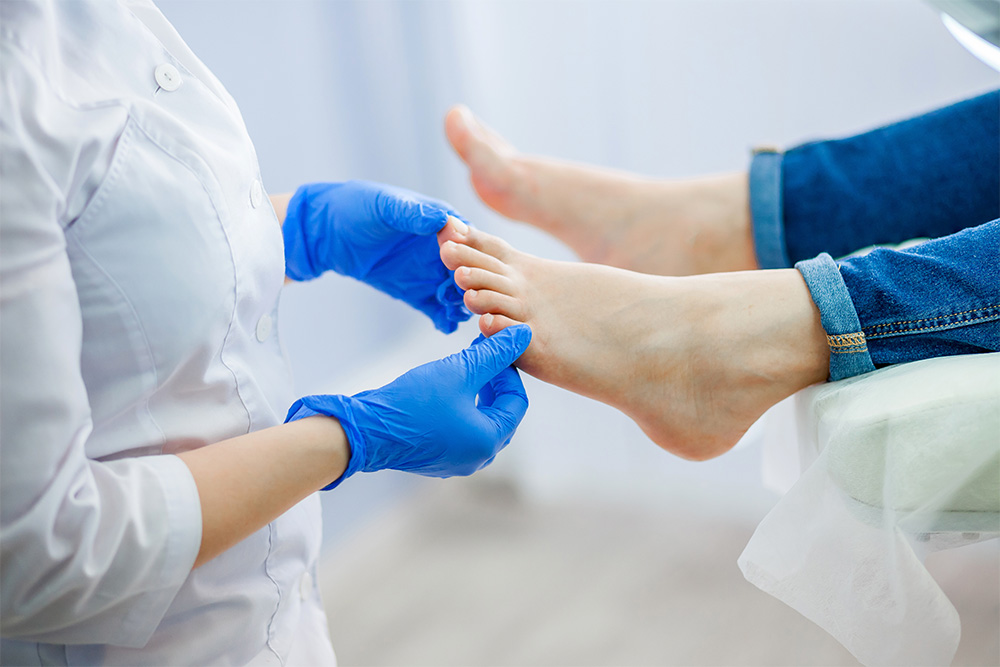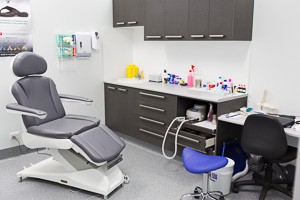

Our centres provide the full scope of clinical podiatry including comprehensive foot assessments, various treatments and surgery. Sometimes your feet just need a bit of pampering and we also offer a large range of aesthetic podiatry procedures and foot care products to help ensure that your feet are always at their very best.
Assessments for:
- Diabetic screening and foot care advice
- Lower limb circulation (Peripheral vascular disease) using the latest in Doppler Ultrasound technology
- Biothesiometer (sensation) testing to detect peripheral neuropathies
- Pressure testing
- Gait and posture analysis
- Surgical advice
Treatments for:
- Corns and calluses
- Ingrown and fungal toenails
- Foot ulcers
- Blisters
- Claw and hammer toes
- Interdigital soft corns
- Cracked and split heels
- Bunions
- Tinea pedis (Athlete’s foot)
Surgery for:
- Chronic or acute Ingrown toenails
- Stubborn painful Plantar warts using cryotherapy
We adhere to the strictest infection control procedures to ensure the safety of patients and staff. All instruments are prepared and sterilized in accordance with the National Infection Control Guidelines Australian Standards AS 4187 – 1994 Code of Practice.
Clinical Podiatry FAQ’s
Who will benefit from a clinical podiatry appointment?
Children, adults and the elderly can all benefit from a clinical podiatry appointment. Older adults attend regular clinical podiatry appointments to keep their feet well-managed and cared for by having their toenails trimmed and reduced in thickness, managing corns and callus, and monitoring their overall foot health.
Adults often attend for painful corns and calluses, cracked heels, recurring blisters, ingrown toenails, warts, fungal nail and skin infections, bunions and hammertoes.
Kids often attend for plantar warts, ingrown toenails, and toe deformities like hammertoes.
Is my clinical podiatry appointment covered by DVA, my care plan, or by my private health fund?
If you have a valid DVA gold card, then it is highly likely that your appointment will be covered with no out of pocket expense. If you have a care/management plan for a chronic condition such as diabetes, your clinical podiatry appointments will attract a medicare rebate for the total number of sessions your GP has outlined on your plan. This is up to 5 appointments per year. If you have extras cover with your private health fund, and you have opted to include podiatry, then it is likely that part or all of your appointment will be covered by your health fund, and we have HICAPS facilities on-site for an instant rebate. Your level of cover, or the presence of any cover, is controlled by your health fund and not us, so if you are unsure of whether you are covered or your level of cover, you must check this with your health fund yourself before your appointment. We do not have access to this information.
I have corns and calluses. Will a clinical podiatry appointment help me?
Absolutely. We will care for all corns and calluses on your feet during your appointment.
How often should I have a clinical podiatry appointment?
For those with ongoing needs like thick, elongated toenails and recurring corns or callus, this is usually between 4-10 weeks between appointments, depending on how quickly the problems or pains return. Your podiatrist will be able to advise you of this at your first appointment. If you have a plantar wart, depending on your chosen treatment, you may need to return weekly for 2-3 weeks. Others may not need to return past their first appointment. If you need to return, your podiatrist will let you know.
I’ve never been to a podiatrist before. Should I book in for a clinical podiatry appointment?
Firstly, thank you for choosing us and welcome to the My FootDr team! If it’s your visit with us, it’s going to be either for a clinical podiatry appointment or a biomechanical assessment. Biomechanical assessments are related to foot, heel, ankle and lower limb pain. For example, muscle strains, bone pain, sprains and the like. Clinical podiatry is often more related to the skin and nails, diabetes, deformities like hammertoes and bunions, infections, and the like. If you’re unsure which category you fall into, give us a call to book your appointment and our reception team will advise you which appointment type you fall under. There is a time difference between the two with biomechanical appointments being scheduled for longer to comprehensively investigate your foot pain and perform a range of analyses.
I have an ingrown toenail. Should I book in for a clinical podiatry appointment?
Absolutely, we treat ingrown toenails in our clinical podiatry appointments.
I get foot pain when I’m out and about. Should I book in for a clinical podiatry appointment?
If the foot pain is muscular, bony, or you’re not sure what is causing it, then it will likely be a biomechanical assessment that you need to book in for. If your foot pain is caused by a corn, callus, wart or other prominence on your skin, then yes, please book in for a clinical podiatry appointment. If you’re unsure which category you fall into, give us a call to book your appointment and our reception team will advise you which appointment type you fall under.


